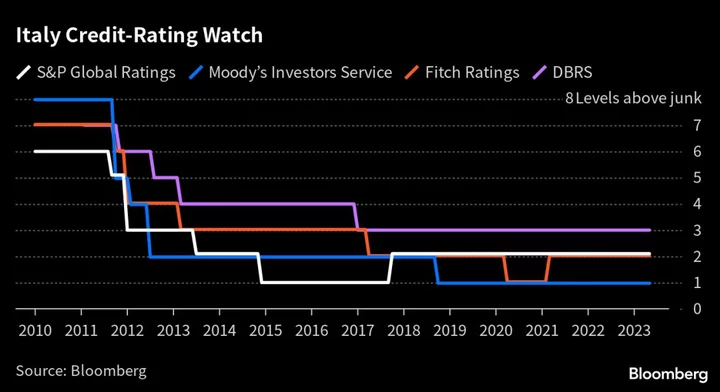With the curtain falling on Italy’s budget show for 2024, it’s now time to read the reviews.
A relatively muted investor reaction to the loosened deficit plans of Prime Minister Giorgia Meloni’s government will now be tested by a series of credit assessments, along with the judgment of European Union officials.
At least five companies are scheduled to provide updates on Italy’s ratings in coming weeks. The potential Nov. 17 announcement by Moody’s Investors Service may be the most sensitive pressure point, given that it assesses the country at Baa3, just one notch above junk, with a negative outlook.
Traders broadly see a downgrade from any of the firms as unlikely, but nerves about Italy’s debt may stay taut. The yield spread over German 10-year notes, a common gauge of risk, is close to its highest levels this year.
“We believe that the bar to a downgrade to non-investment grade remains high — though the ratings agencies may fire a shot across the bows to ensure Italy retains a degree of fiscal discipline,” said Gareth Hill, senior fund manager at Royal London Asset Management.
Meloni’s plan to run wider deficits exceeding the European Union’s 3%-of-output limit until 2026 — a year later than planned — was revealed at the end of September. Parliament ratified it, and a coalition cabinet meeting on Monday signed off on spending including tax cuts and measures to encourage parenthood.
Finance Minister Giancarlo Giorgetti has said he doesn’t fear the judgments of sovereign-ratings analysts and that the budget will be “well received” in Brussels. That confidence rests on his view that the less restrained outlook for the public finances still has prudence at its heart.
What Bloomberg Economics Says...
“Meloni’s ambition to honour costly electoral promises has put Italian debt back in the spotlight. Her new budget plan offers only a modest boost to growth next year, and little long-term benefit to the economy. The public finances are in worse shape as a result and the attention the plans have drawn raises risks at a time when borrowing costs are rising.”
—Simona Delle Chiaie, euro-area economist
Even so, Fitch Ratings flagged concern on the deficit profile last week, and analysts are focusing on the fallout from rising borrowing costs after the European Central Bank’s fastest round of interest-rate hikes on record.
While that’s impacted government across the euro area, Italy’s massive debt load, exceeding 140% of output, potentially renders it more vulnerable. The nation’s 10-year borrowing costs recently breached 5% for the first time in more than a decade.
“Idiosyncratic risks are likely to come to the fore as these rating decisions come close,” said Rohan Khanna, head of euro rates strategy at Barclays Plc in London. “We cannot rule out outlook changes, at the minimum.”
Rating Review Schedule
Italy’s failure to comply with EU fiscal rules is also raising worries, given that its eligibility to tap the ECB’s crisis tool rests on its compliance with the bloc’s regime. The existence of that backstop has arguably helped keep its spreads in check for much of this year.
Analysts at Scope Ratings wrote in a report this month that the availability of the ECB’s so-called Transmission Protection Instrument is a “key driver” of its relatively high BBB+ assessment on the country.
While a suspension on the EU’s 3% deficit rule will end next year, there’s expectation that Brussels won’t fully enforce that regime given the challenging economic backdrop.
“If the relations between Italy and Europe become sour, and Italy really steers away from the fiscal rules, that could lead eventually to an excessive deficit procedure and that could limit the possibility of the TPI,” said Nicola Mai, portfolio manager and sovereign credit analyst at Pacific Investment Management Co. “Having said that, I do think that there’s going to be coordination between Italy and Europe.”
One test of that relationship will be an assessment due on Nov. 21 by Brussels officials on the budget plan, which may give clues about how stringently they will hold Italy to account. Economic forecasts from them a few days earlier, on Nov. 15, will also point to the challenges the country faces.
Italy’s finance chiefs have been at pains to stress that borrowing costs, while higher than they were, are manageable. Central bank Governor Ignazio Visco told Bloomberg Television last week that “there are no signs” that spreads are at a point that would require intervention.
Giorgetti himself suggested to reporters on Monday that he doesn’t perceive a danger zone as such. “There are no levels on spreads that are red or yellow or other,” he said.
--With assistance from Dayana Mustak and Jorge Valero.

